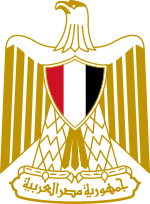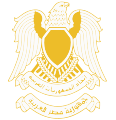Coat of arms of Egypt facts for kids
Quick facts for kids Coat of arms of Egypt |
|
|---|---|
 |
|
| Armiger | Arab Republic of Egypt |
| Adopted | 4 October 1984 (Present form) |
| Blazon | Tierced per pale gules, argent, and sable |
| Supporters | The Eagle of Saladin |
| Motto | Arabic: جمهورية مصر العربية (Gumhūriyyat Miṣr al-ʿArabiyyah, "Arab Republic of Egypt") |
The coat of arms of Egypt is also called the Republican Eagle or Egyptian Golden Eagle. It shows a golden eagle, which is a symbol used in heraldry (the study of coats of arms).
This eagle faces to the left. On its chest, it has a shield with the red, white, and black colors of the flag of Egypt. These colors are shown in vertical stripes. The eagle holds a scroll in its claws. This scroll has the official name of Egypt written on it in Kufic script, which is an old style of Arabic writing.
The first version of the Eagle of Saladin was used by Saladin, who was the first Sultan of Egypt. The modern design of the eagle became the coat of arms after the Egyptian Revolution of 1952. This eagle symbol was later adopted by many other countries in the Arab World, like Iraq and Palestine. The current design of Egypt's eagle was updated in 1984.
Contents
History of the Egyptian Eagle
Eagles have been important symbols of power in Egypt for thousands of years. You can see them in ancient Egyptian art and on the flags of rulers from different times, including Pharaohs, Christians, and Muslims.
Saladin's Eagle
One famous ruler was Saladin. He chose an eagle as his personal symbol when he became Sultan of Egypt in 1174. Saladin was known for taking Jerusalem back from the Crusaders. Because of this, the eagle named after him became a symbol of Egyptian and Arab pride.
Later Egyptian rulers, from Saladin's own family (the Ayyubid dynasty) and the Mamluk soldiers who followed them, continued to use the eagle.
The 1952 Revolution
The eagle became the symbol of the Egyptian Revolution of 1952. Leaders like Mohamed Naguib and Gamal Abdel Nasser used the eagle. They put the old flag of the Kingdom of Egypt (which had a green background with a white crescent and stars) on the eagle's chest.
They also placed the eagle in the middle of the new flag's red, white, and black stripes. These colors are known as the Pan-Arab colours. They represent different historical Islamic empires. The color green was also very important for Egyptian pride, especially after the Egyptian Revolution of 1919.
Changes Over Time
When Egypt and Syria joined together to form the United Arab Republic in 1958, the eagle's look changed. The shield on its chest now showed the flag of the United Arab Republic. This flag had two green stars in the middle white stripe. These stars stood for Egypt and Syria.
The eagle also held a green scroll with the union's official name. Even though the eagle was not on the main flag, it was still the union's coat of arms. This meant it appeared on government buildings and documents.
Later, in 1972, during the time of Anwar Sadat, the Eagle of Saladin was replaced. Egypt joined the Federation of Arab Republics, and a different bird, the Hawk of Quraish, became the new coat of arms. This hawk also replaced the green stars on the national flag.
The Eagle Returns
The Federation of Arab Republics did not last long. In 1984, the Eagle of Saladin was brought back as Egypt's coat of arms. It has been the symbol ever since. The eagle also returned to the center of the national flag.
The eagle's design from 1958 was mostly kept. However, the eagle itself was made entirely gold and white. The shield on its chest still shows the red, white, and black stripes of the national flag. This means the color green, which was important in earlier flags, is no longer part of the current coat of arms or flag.
What the Eagle Looks Like
The Eagle of Saladin holds a scroll. On this scroll, the name of the country is written in Arabic: Gumhūriyyat Miṣr al-ʿArabiyyah, which means "Arab Republic of Egypt."
The eagle has a shield on its chest. This shield shows the colors of the Egyptian flag. However, the stripes are vertical instead of horizontal. When you see the eagle on the national flag, it is shown in gold and white.
During the time of the United Arab Republic (1958–1961), the eagle's shield had two green stars. These stars represented the two countries in the union. Between 1972 and 1984, the golden Hawk of Quraish replaced the eagle. This was part of the symbols for the Federation of Arab Republics.
-
Coat of arms of the Egypt Eyalet (1854–1867)
-
Coat of arms of the Khedivate of Egypt (1867–1914)
-
Coat of arms of the Sultanate of Egypt (1914–1922)
-
Coat of arms of the Kingdom of Egypt (1922–1953)
-
Coat of arms of the United Arab Republic (1958–1971) and Egypt (1971–1972)
-
A version of the coat of arms as it appears on the Flag of Egypt
See also
 In Spanish: Escudo de Egipto para niños
In Spanish: Escudo de Egipto para niños
- Flag of Egypt
- Coat of arms of the United Arab Republic
- Coat of arms of Iraq
- Coat of arms of Palestine
- Coat of arms of Syria
- Coat of arms of Sudan
- Coat of arms of Libya
- Coat of arms of Yemen
- Eagle of Saladin
- Armorial of sovereign states
- Heraldry
- Country coats of arms
 | Victor J. Glover |
 | Yvonne Cagle |
 | Jeanette Epps |
 | Bernard A. Harris Jr. |











